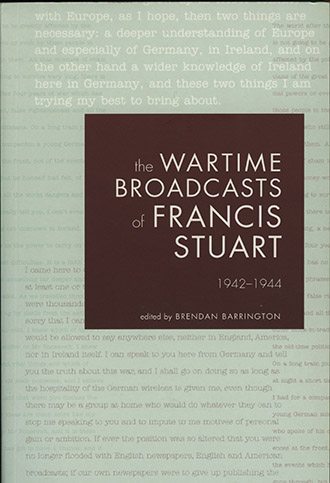
The Wartime Broadcasts of Francis Stuart 1942- 1944
Edited by:
Publication Date: September 2000
€25.00
OUT OF PRINT, EBOOK AVAILABLE
‘It has taken Brendan Barrington’s superbly scholarly edition of Stuart’s broadcasts to show us how such crucial moral and cultural debates ought to be conducted: calmly, rigorously and on the basis of real evidence. If Stuart comes badly out of this fascinating book, the polemicists on either side of the debate that raged around him don’t emerge with much credit either. Thanks to Barrington’s exemplary scholarship we can now see Stuart’s novels as works of European significance: the attempts of a deeply implicated collaborator to cope imaginatively with the burden of guilt.’ – Fintan O’Toole, Irish Times
‘The material is fascinating, and the masterly long introduction illuminates Stuart’s semi-autobiographical novel Black List Section H perhaps more that he would have wanted.’ – Roy Foster, Sunday Tribune
In January1940, shortly after the outbreak of the Second World War, the novelist Francis Stuart (1902-2000) moved from County Wicklow to Berlin, where he had accepted a university lecturing position. Stuart remained in he Third Reich for the duration of the war, and between 1942 and 1944 he made over one hundred broadcasts on German radio to Ireland. The German sojourn and the broadcasts have been at the heart of the long-running controversy over Stuart, and yet remarkably little is known about them. Herein are published the complete surviving transcripts of Stuart’s broadcasts, which represent between two thirds and three quarters of his total output. While Stuart often referred to himself as a ‘neutral’ uninterested in making propaganda, the talks were consistent with the broad thrust of German wartime propaganda to Ireland, and took an often fiercely anti-Allied line. Stuart spoke repeatedly of the necessity of a united Ireland, and suggested that a German victory could bring this about. He spoke warmly of his admiration for the German people and for Hitler.
The editor’s extensive introduction shows that Stuart’s pre-war political interests and commitments were consistent and often passionately held – from a 1924 essay in wich he compared Ireland’s struggle against Britain to Austria’s against the Jews, to a 1938 letter to the Irish Times opposing plans to receive refugees fleeing Hitler – and intimately tied up with his creative work. (Stuart more than once stressed to his listeners the continuity between what he had tried to express in his fiction – for example, the pro-brownshirt ‘sympathies’ of a 1933 novel, Try the Sky – and the message of his broadcasts.) The introduction also gives an account of Start’s involvement in collaboration between the IRA and the Germans during the war, and suggests that his achievement as a writer can never be adequately assessed until the nature of the relationship between his novels, his politics and his life is confronted squarely.
Out of stock
| ISBN | 9781901866544 |
|---|
| Weight | 0.5 kg |
|---|---|
| Publication Date | September 2000 |
| Format | Paperback, 192pp |

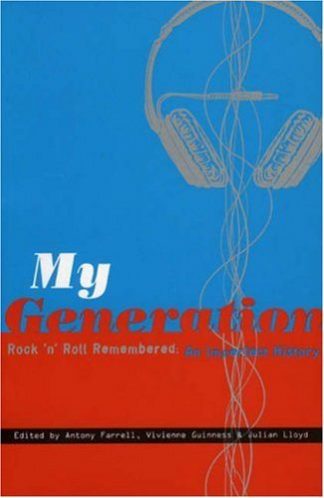
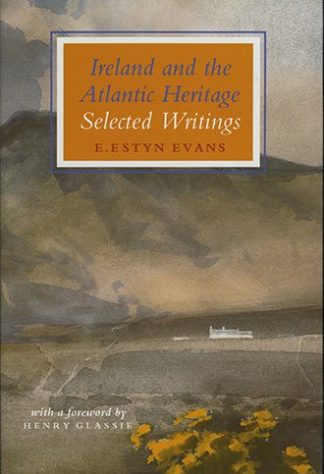
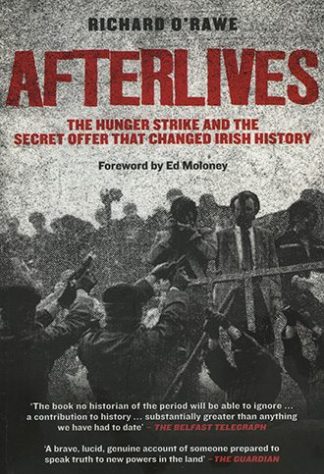
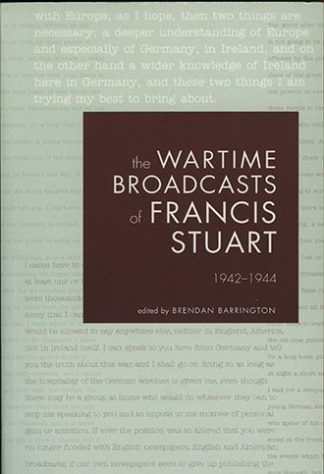
Lilliput Press –
“Francis Stuart was an Irish novelist who, during World War 2, moved to Germany and made a series of anti-Allied, pro-German propaganda broadcasts to Ireland on Nazi radio. These broadcasts were monitored by G2, the Intelligence section of the Irish Army, transcribed and preserved in the Irish Military Archives.
After the war, Stuart’s record as a collaborator made it difficult for him to find work. Nevertheless, he kept on writing and his work increasingly revolved around themes of betrayal and isolation. In the early 70s, his best novel “Black List, Section H” attracted the attention of a generation of young Irish people, many of whom would become important writers and journalists. Stuart’s independence and resolutely critical stance became something of an inspiration to writers such as Colm Toibin, Fintan O’Toole, Paul Durcan and Hugo Hamilton. Part of this was due to the fact that although it was known that he had made broadcasts on Nazi radio, nobody had a record of what he had said. Stuart himself said that the broadcasts had been “mostly about literature”. His books, his own public statements and his friends all painted him as a political innocent who had strayed into collaboration because of his mysterious and strangely moving obsession with suffering. His hatred of democracy (which he associated with venality and material gain) was characterised as a brave and inspiring rejection of easy consensus.
The situation changed when this book was published, two years after Stuart’s death. Brendan Barrington, a young American of Irish origin, retrieved the transcripts of the broadcasts and presented them in this book, along with a long and highly acute introduction that placed them in the context of Stuart’s pre-war fiction and political statements. When Stuart spoke on German radio, he was very far from being a naive young man in his early 20s; he was already forty, and had published almost a dozen novels.
The content of the broadcasts forced some, but not all, of Stuart’s fans to make a painful reassessment of their hero. The broadcasts were not “mostly about literature”, or even partly about it. They were, for the most part, straight and rather pedestrian anti-Allied propaganda, full of lavish praise of the German “fighting spirit”, evident admiration for Hitler and long passages angrily denouncing the Allied leadership as being corrupted by an unhealthy fondness for democracy. Stuart was revealed as being an out-and-out Nazi shill. His postwar novels were not, as had been previously thought, painfully honest meditations on events that had actually happened to Stuart and decisions and actions he had actually made, but self-serving fantasies designed to paint his actions in the most favourable possible light.
So why four stars? Because somebody had to reveal the truth about Francis Stuart, and Brendan Barrington did so. This book is a model of responsible and honest scholarship, which is a lot more than you can say for practically everything else ever written about Stuart.
Towards the end of his life, Stuart was given the greatest honour that Ireland can give to a writer: he was awarded the title of “Saoi” by the publicly-subsidised Irish artists’ council Aosdána. He subsequently appeared in a TV documentary in which he characteristically declined to regret having been a Nazi collaborator. Shortly afterwards, the distinguished poet Maire Mhac an tSaoi, a member of Aosdána, proposed a motion that Stuart should publicly apologise for his remarks, and also resign from the council. A majority of Aosdána’s members voted against the motion. Maire Mhac an tSaoi, to her eternal credit, resigned from the council in protest.
Stuart’s best writing is extremely narrow in scope and limited in quantity. He wrote an enormous amount, but even his admirers would concede that the bulk of his work is second-rate. His obsession with violence and suffering was pathological. His fondness for provoking scandal was adolescent. He was, as his admirers admit, a clumsy and graceless writer. Although he personally seems to have been in his later years a man of great personal charm, as a writer he suffered his whole life from a chronic lack of sympathy for (and interest in) other people.
Finally, compare him to his exact contemporary and, politically speaking, exact opposite, George Orwell. Orwell spent his brief career trying to speak for people who he felt needed someone to speak up for them. Stuart spent the first part of his very long career speaking up in favour of hatred, violence and chaos, and then spent the second part of it glossing over the things he’d done in the first part. Most of Stuart’s work is only of interest to the literary historian. In non-fiction, at any rate, Orwell was hardly able to write an uninteresting sentence.
I recommend this book. It’s the only book by Francis Stuart that most of us will ever need to read.”